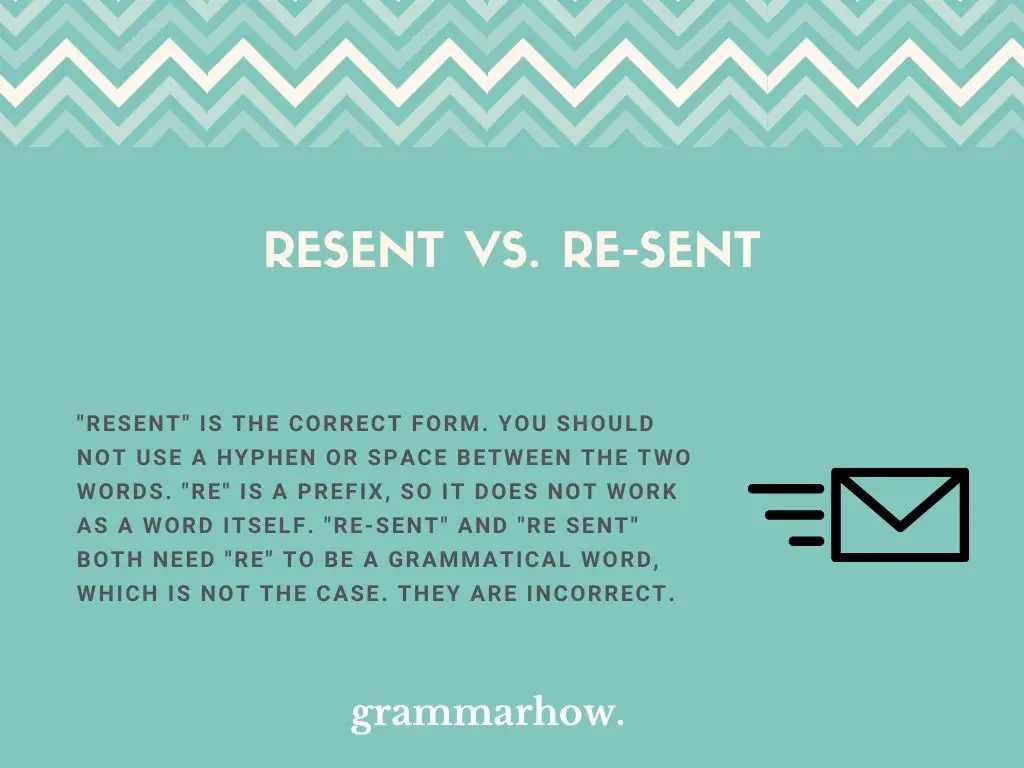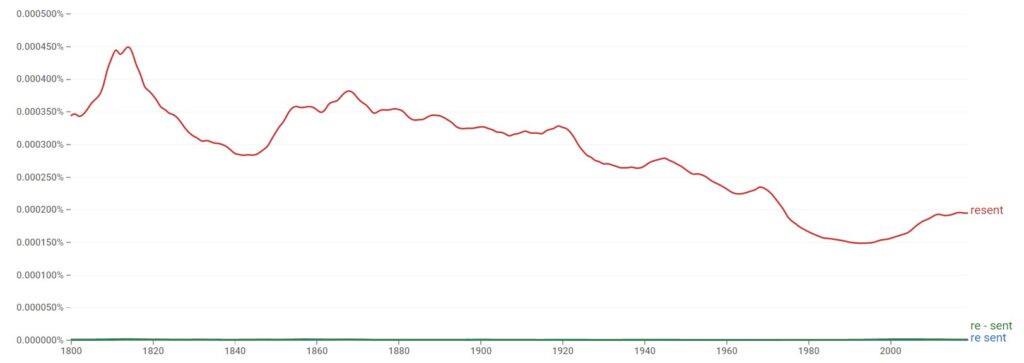If someone has “resent” something, you might want to know how to spell the word. You might have seen it as one or two words (or even hyphenated in some situations). This article will explore the correct form you need to stick with.
Resent vs. Re-sent
“Resent” is the correct form. You should not use a hyphen or space between the two words. “Re” is a prefix, so it does not work as a word itself. “Re-sent” and “re sent” both need “re” to be a grammatical word, which is not the case. They are incorrect.

According to Google Ngram Viewer, “resent” is the only correct form. This is partially due to “resent” also meaning “to hate” (as a noun). However, it is also the only correct form that works of the three we’re discussing in this article.

While “resent” doesn’t have an entry related to “sending again,” the present tense verb form “resend” does. It is written without a hyphen in both The Cambridge Dictionary and The Oxford Dictionary.
Neither dictionary notes that “re send” or “re-send” should be used in any situation. The same rules apply to the past tense “resent.”
Is “Resent” One Word?
“Resent” is the only correct form. You should use it when you are saying that someone will “send again.” “Re-” is a prefix that means “again,” and it must be connected to the root word (“sent”) when it is modifying it. It becomes a verb when used in this way.
Here are some examples to show you how to use “resent” in a sentence:
- These need to be resent. I don’t think I’ve ever seen so many people complain about this stuff.
- I resent it all to make it look better. I hope that’s good enough for you.
- It will be resent later on today. That’s as good as we’re able to do right now.
- Shouldn’t this be resent? There are so many grammatical mistakes here.
Is “Re sent” Two Words?
“Re sent” is never correct as two words. You cannot treat “re” as an independent word. It is a prefix, and it needs a root word (like “sent”) to help it work in a sentence. There are no situations where “re sent” should be used.
“Re sent” is never correct, and these examples will show you why:
- Correct: It was resent by someone outside of this server. How weird is that?
- Incorrect: I thought it was re sent for a reason. Clearly, I don’t know what I’m talking about.
- Correct: It has been resent. There’s nothing more we can do here.
- Incorrect: I re sent it for you. I hope that makes up for my mistake.
Is “Re-sent” Hyphenated?
“Re-sent” cannot be hyphenated. It is grammatically incorrect in this form because you should not hyphenate the prefix “re-” with the root word “sent.” “Re-” does not count as a grammatical word when it’s hyphenated like this, which is why “re-sent” is incorrect.
According to AP Style guides, you only need a hyphen when two or more words are used to modify a noun. Since “re” and “sent” are not used to modify any nouns (“resent” is a verb), you do not need to use any hyphens with them.
Since “re-sent” is not correct, the following examples will show you which form is correct.
- Correct: I will need this to be resent before I can do anything that will help us out here.
- Incorrect: It will not be re-sent in time. We need to find somebody who is going to be able to help us.
- Correct: You resent the message before they even had a chance to reply. That’s not a smart move.
- Incorrect: I re-sent it because I thought it needed to be. Nobody replied to me the first time around.
Tip To Remember The Difference
When using “resent” to mean “sent again,” there aren’t many things that we can say to help remind you of that. Luckily, if you know that “re-” is a prefix, you should have a good chance of remembering that no hyphen is needed.
To remember the difference, remember that “resent” means “sent again.” “Re-” is a prefix. When it is grouped with a root word (“sent” in this case), it does not need a hyphen. It becomes part of the word. That’s how you remember “resent” is the only correct form.

Martin holds a Master’s degree in Finance and International Business. He has six years of experience in professional communication with clients, executives, and colleagues. Furthermore, he has teaching experience from Aarhus University. Martin has been featured as an expert in communication and teaching on Forbes and Shopify. Read more about Martin here.

